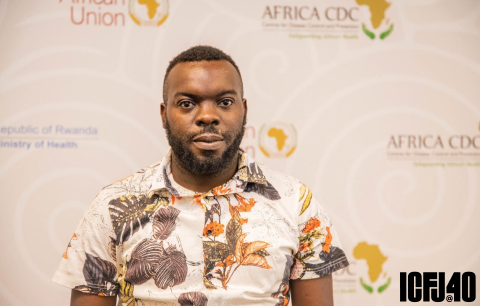This year, ICFJ is celebrating our 40th anniversary and our long history of supporting journalists. Throughout the year, we will be showcasing network members from around the world.
Leon Lidigu’s journalism focuses on the intersection of health and climate, highlighting key issues faced by the Kenyan population, and women in particular. Lidigu is a global health and climate reporter for one of Kenya’s leading newspapers, The Nation.

Lidigu followed ICFJ closely as a journalism student through IJNet’s resources and articles. In 2021, Lidigu was selected as the first-place winner in ICFJ’s Global Nutrition and Food Security reporting contest. In 2022 Lidigu won second place in ICFJ and World Health Organization’s Violence Against Children Reporting Contest. In 2023, he was awarded best health journalist in Kenya by the Media Council of Kenya at the Annual Media Excellence Awards.
Throughout his involvement with ICFJ, Lidigu strengthened his network and gained valuable experience in how to share unique stories.
Here’s what Lidigu had to say.
What is something impactful that came out of your work with ICFJ?
During my ICFJ fellowship, I did a story titled “The Cost of Malnutrition.” I went to one of the biggest slums in Africa, called Kibera slums in Kenya, and spoke to children who are going to school without even a meal. I then highlighted their stories in a multimedia investigative feature. The story won two awards: the ICFJ award and also a Kenyan award. But most importantly for me, people wrote to me from the United States of America and pledged to feed that school and support that school. For me, I go to bed very happy knowing those children don't go to bed hungry because of the story.
What did you learn as an ICFJ fellow?
ICFJ taught me how to make my stories have impact. The most impactful aspect of the Global Nutrition and Food Security Reporting Fellowship was to put faces to the stories we do. It's something that I had to learn. For one of my projects, I went to Marsabit, in northern Kenya where women were suffering because there’s never any rainfall and, therefore, no food. I got a chance to speak to these women. Some didn't even have breast milk to breastfeed their children. So I got first-hand information and experienced how people sleep hungry and how it affects them and how it affects children in terms of development, in terms of even reading in class, and in terms of nutrition.
I did stories looking at how nutrition impacts girls' school attendance, because I came across a school where girls were fainting from low iron. Experts established that most of these girls are going to school without eating food that is properly balanced. Then, I went back to start educating people on how to balance the food on their table.
Why is it so important right now to provide the kind of support to journalists that ICFJ does, especially in the region where you work and/or on the issues you work on?
ICFJ’s work is very important because, in this part of the world, most of us don't have the resources to learn through fellowships and trainings. Thanks to ICFJ we have an opportunity, because when you look at the media system in Africa it is grappling right now. I have colleagues in other newsrooms who haven't been paid for six, seven, eight months. We end up bringing back what we have learned to do good journalism that will impact the lives of Kenyan citizens, and in Africa as a whole.
Secondly, there's a lot of interesting information on ICFJ’s IJNet website, with regards to climate change. Climate change is currently a very big issue, and for journalists like me, I have to connect food to the climate crisis. I have to look at how patients living with HIV and on antiretroviral medications cannot afford anything to eat because of the climate crisis. Most of the tools to better understand how to find this information, I find from the toolkit provided by IJNet. With crisis reporting, there is also a very interesting forum on the website. Additionally, we can engage with colleagues who have been members of the ICFJ network. I now have colleagues from other countries who have taught me a lot which is very instrumental.
What are you currently working on - or what do you want to work on - that you’re excited about?
Two weeks ago, I released an investigative feature on Kenya's biggest hospital. It is titled “Death in the Corridors of Kenyatta National Hospital.” I came across patients who died waiting for treatment – someone lost a mother just sitting in the hospital line. For three months, I followed up on that story. I tried to establish why Kenya's biggest referral hospital is behaving like this. There are so many complaints.
I also looked at the mortuary situation and found many bodies of dead babies, some just rotting on the floor. There was no hygiene, mothers sharing maternity hospital beds. It was just a total mess. So I know the government is currently so annoyed with me because of that, but I felt it's important we highlight it, and I've actually been banned from ever appearing at that hospital even as a patient.
Apart from that, for the last five months I've been working to investigate how counterfeit alcohol is harming Kenyans. We have a lot of fake illicit alcohol that our drug agencies are linking to the rising cancer cases in the country. So I've been doing a lot of undercover investigative work just to understand how these businessmen who are making counterfeit alcohol are doing it. And the potential impacts.